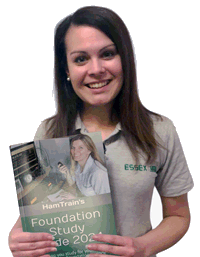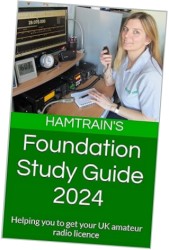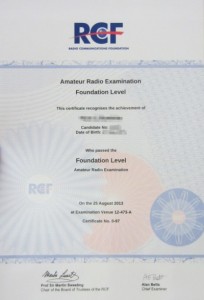

The good news is that it’s now easier to get an amateur radio licence than ever before! Years ago, anyone interested in becoming a radio amateur was required to take complex tests involving electronics theory, radio construction and in most cases, learn Morse code.
Things have changed here in the UK, making it considerably easier for newcomers to get started in the amateur radio hobby.
You can now become a radio ham in just a few weeks by getting the entry-level Foundation Licence – you don’t even need to leave home, as you can study at home, and even take the exam at home.
On this page, we explain more about getting on-air with a ham radio Foundation Licence.
The Foundation Licence is an introductory licence to encourage new amateur radio operators to get a taste of the hobby, and to get on-air. As a Foundation licence holder, you’ll have access to a range of different frequencies, and if you enjoy the hobby, may want to progress to the Intermediate and Full licences.
Getting a Foundation Licence will allow you to transmit on the VHF / UHF and HF bands up to a power of up to 25 watts, which with a modest aerial and radio will be enough to get your radio signals into much of Europe and beyond.

One of the easiest ways to get a licence is to use our free online training course. This teaches you all you need to know, with videos, printable revision aids and loads of quizzes. Find out more here: Essex Ham’s Foundation Online course. Alternatively, you can study at one of the many ham radio clubs across the UK.
If you’re considering taking your exam, you may also want to check out the Foundation Study Guide – This low-priced book explains all of the basics, contains handy bits of information for the newbie amateur, and tells you what you need to know to pass the exam. It’s based on Essex Ham’s Foundation Online course, and even includes a mock test. The Foundation Study Guide is available in Paperback version and Kindle version.
With free courses and online exams, getting into the amateur radio hobby has never been easier, and this site has helped over 10,000 people to get started on their amateur radio journey.
These two videos explain a little more about the hobby, and how to get started by getting a Foundation licence:
To get your first amateur radio licence, you’re required to sit a 26-question multiple-choice exam. You have the option of home-study using a free online course such as our Foundation Online course, studying with the help of a local amateur radio club, self-study using a training manual such as the HamTrain Study Guide, or with help from another licenced radio amateur.
The exam is pretty straightforward and covers the following categories:
You have 60 minutes to answer the 26 questions, and if you’ve paid attention during the course, then the exam should present no problems at all. To pass, you’ll need to get 19 of the 26 questions correct (73%). For more, see Getting Started: Foundation Exam.


You normally get your results immediately after taking your exam. Assuming you pass, you’ll be sent a Pass certificate by post from the RSGB (Radio Society of Great Britain).
Your details will be passed on to the UK regulator, Ofcom, and you’ll be able to apply for your licence and callsign.
For details of how to do this, see: How to apply for your amateur radio licence
Your Foundation callsign will begin with “M7” followed by three letters, and you can pick those three letters yourself (if the callsign you’re after hasn’t been taken)
Once you have your callsign and your licence, you’re able to start transmitting on HF (long-distance) and VHF/UHF (shorter distances), and you can start to see where the hobby takes you.
Hopefully, this page has given you a feel for the process and how to get started. If you are keen to get on and get your licence, it’s a case of studying for the exam.

You can learn by taking an online course, reading the course book, or visiting a local amateur radio club. A good number of amateur radio clubs offer training courses and support.
If you want to study online, try our free Foundation Online course to help you study.
If you’d prefer to study at a club, put your address into the RSGB Club Finder to find your nearest one.